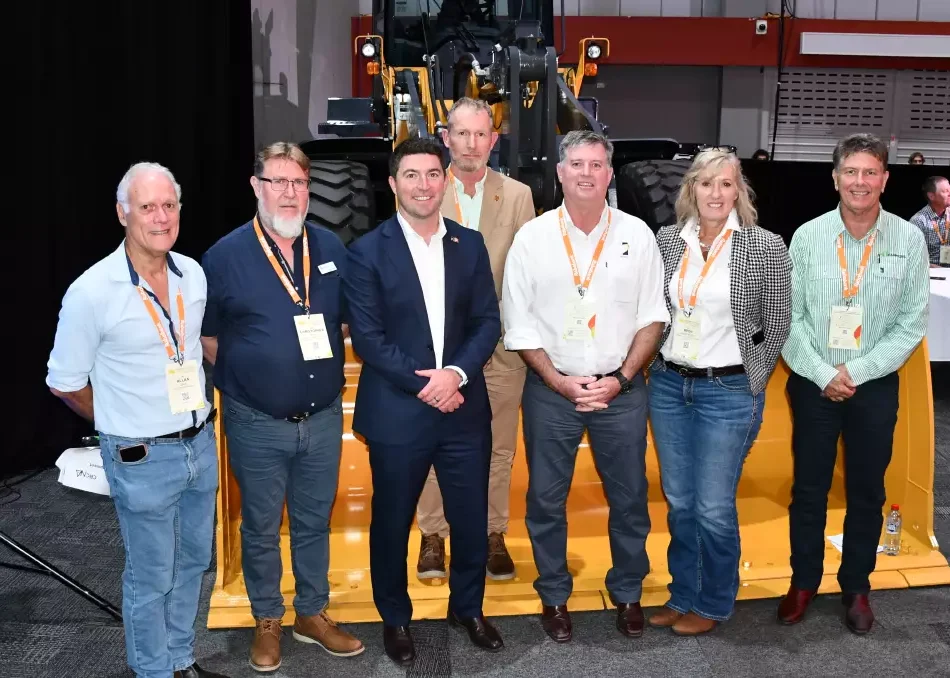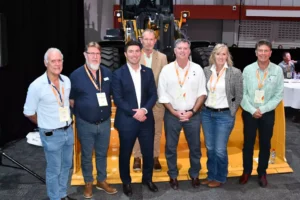Change needed to ensure northern Australia can take advantage of opportunities
There are bountiful opportunities for development in northern Australia but massive hurdles to overcome to make sure they can be capitalised upon, according to Professor Allan Dale.
Professor Dale is the independent chief scientist of the CRC for Developing Northern Australia (CRCNA).
He led a discussion titled ‘Where to next? Development in Northern Australia’ at the Northern Australia Food Futures Conference in Darwin this week.
Conference speakers Professor Allan Dale, Christopher Ham, Joshua Burgoyne, Fritz Bolten, Shane McCarthy, Bron Christensen and Simon Smith. Picture by Paula Thompson
“There is very significant development opportunity, we have land, we have water, we have energy, we have space, we have infrastructure, we have people,” he said.
“As an agriculturalist, I see the great value and opportunity we have before us.
“But it’s also one of the last significant undeveloped areas globally, so that makes it of global significance, in terms of its conservation value and its cultural values.”
While opportunities abound, there are significant challenges.
One of these is securing investment for feasibility studies.
“The Northern Australia Development program put feasibility money on the table for small to medium business – and that money went out the door like hot cakes – demonstrating the demand for that kind of investment in feasibility work,” Prof Dale said.
“Investment tends to skew towards the very large corporate and resources sector parts of the economy, what it tends to let down is the more small to medium business sectors and more organic place-based economies like agriculture and tourism.”
Prof Dale said he likened this situation to an iceberg analogy.
“There is progress, and quite a bit of success, at the big end and the top end of that iceberg and that’s what we’re seeing,” he said.
“But below are the people struggling to invest in northern Australia. We’ve got to lift that iceberg up and get stronger support mechanisms in place.”
Another challenge is the fact that in most northern regions, there may be up to 30 distinct governance subdomains influencing decisions about agriculture. These can include vegetation planning, cultural heritage, biosecurity, energy planning, ports planning, coastal management, climate adaptation and water quality planning.
“They are all necessary and important, but the system does not support the process to get people from (the point of) we’ve got a vision towards an outcome,” he said.
“You’ve got to navigate, as a proponent and industry, through this complexity without much support.”
Prof Dale presented a case study of the potential development of the Gilbert River catchment.
The Gilbert is an ecologically robust catchment with a water resource plan allocating 464 gigalitres.
“It has a water resource plan that says there are 464 gigalitres of water available,” Prof Dale said.
“There are 464 gigalitres of water on the table for development and consumptive use, but then we have the Vegetation Management Act that says, by the way, you can’t clear anything under current mechanisms.”
Prof Dale said the issue was just how to proceed with plans for the Gilbert.
“Maybe large dams in the Gilbert aren’t going to cut it, maybe more innovative offstream storage or innovative overland flow is needed, but we haven’t had the public conversation about these things,” he said.
“It also won’t work if we don’t have the infrastructure, the services and the housing and we have workforce issues.
“Of the water that is available, virtually none of it has been activated into use.
“We have four communities pretty much economically stagnant or going backwards from an economic point of view.
“We’re actually going backwards in environmental terms because of lack of investment in management of those things that cause biodiversity loss.
‘I’m saying if we don’t get this right and play these things out through serious trade-off-based discussions informed by science, that’s where we’re going to head in many parts of northern Australia and I don’t like that future.”
Prof Dale said it was imperative that assessment pathways based on sustainable development were enabled to take the industry forward.
One of the ways to do this was through having a place-based solutions broker.
“We are missing a place-based facilitator, a part of the puzzle that can support regions and communities and the applicants of good planning and development,” he said.



